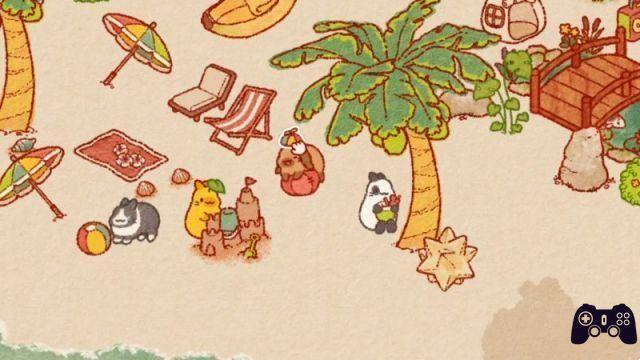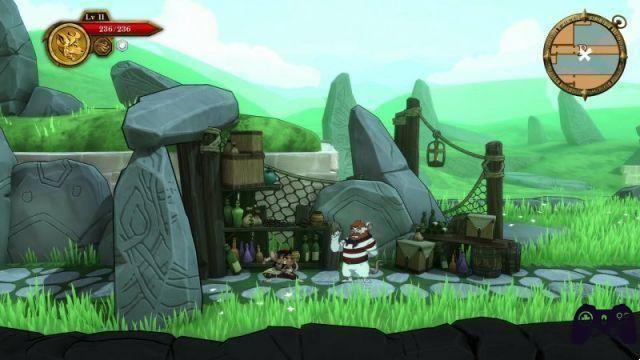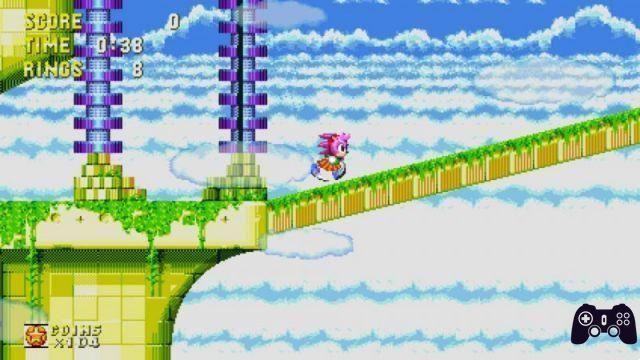In that archipelago full of wonders that is Japan, there is a small island called Okunoshima, in which the previously mistreated bunnies now reign. So secret that it was removed from the country's maps during World War II, the island was the scene of experiments for the production of toxic gases to be used for war purposes. The test subjects were rabbits, which were subsequently exterminated by the US armed forces who discovered the place after the end of the conflict. Today the island is home to a museum dedicated to its sad past, but above all it is home to a lively (and growing) colony of rabbits that attracts tens of thousands of tourists each year.
Usagi Shima (in Japanese "rabbit island") is inspired by the happy present of Okunoshima and the splendid animals that live there. Released for now only in the mobile version in the iOS and Android stores, a future publication on Steam is also planned. Completely free to download (and monetizable, as is the case with this type of product, with completely optional transactions within the game), it perfectly satisfies the needs of those who only have small moments of time to play during the day, and can find in their Cell phones and tablets are ideal platforms for quick and immediate use. We must not forget that video games on mobile devices represent a quarter of the total number of players in Italy and, therefore, contrary to what some PC and console enthusiasts who are a little too extreme say, it is a phenomenon worthy of analysis and deepening. analysis, especially on the occasion of the launch of quality products such as Usagi Shima.
We tell you about the relaxing bunny island in ours Usagi Shima review.
Many rabbits, a desert island.

The story of Usagi Shima begins as a free-time project for Jess Yu, who until a few years ago was a video game developer for a company. Surprised by the positive response on social media when her game was revealed to the public a few years ago, she decided to leave her previous job to focus on Usagi Shima full time. This nature of Yu's "heart project" clearly shines through in the final product, and we're not surprised by the attention the developer has garnered from major platforms dedicated to independent development, including, notably, Healthy games.
We are on a desert island and our goal is to make it welcoming to bunnies who will come to visit us. We start by building a store where, each day, we can buy new furniture and decorations to attract even more animals, and then we set up games for the rabbits that pass by. We felt immediately immersed in the action, without any introduction, and perhaps the first moments of Usagi Shima, so important to captivate players in a lasting way, would have deserved more attention. Despite this, the construction of the adventure at a slow pace (the bunnies take a while to arrive), the beauty of the game's graphic presentation and its relaxing music constitute more than enough attraction for those who want to live a relaxing experience, far away. The frenetic rhythms of other video games.
A desire to greatly simplify all the recreational elements is clearly perceived: although evidently inspired by Animal Crossing, Usagi Shima does not present the player with an infinite variety of furniture, maintaining a style reminiscent of traditional Japan and not offering extravagant alternatives; In addition, all actions can be easily performed with finger pressure, and the most we have to do is drag the objects to be placed on the island from our backpack to the chosen place. The adorable bunnies, the absolute protagonists of Usagi Shima, do the rest so that the player feels in a safe place, a true virtual comfort zone.
relax and wait

We said that the Usagi Shima experience is meant to be lived in free time, and hence Jess Yu's choice to extend the appearance time of the bunnies. All you need to do is appear on the island from time to time to reap the benefits: the carrots, in-game currency, they grow on the ground and can be collected from there (if you want to speed up the process, you can buy them with in-game transactions or duplicate them by agreeing to watch ads), and the bunnies that stop coming to visit us will also give away carrots to thank us for the welcome.
The rabbits, each with a unique name and appearance, and more than thirty in total, each have their own character and tastes. If we find them on the island, we can feed them, pamper them, take photos of them. As the days go by, the island will be increasingly rich in objects, furniture and, therefore, in possible situations: the rabbits will be able to sit at the street food stalls to eat, or get into very narrow openings through which we will have to take them out. (not before taking a photo to capture their adorable clumsiness, of course). As the days go by, we can invite the most faithful bunnies to stay on their island, learning more about their tastes and customs. In the Nook Miles model we can execute daily tasks ("hug five bunnies", "take five photos", etc.) to get extra carrots to buy more furniture. There are also longer range Goals, as well as Cards that can be opened every day for a reward. All of these elements ensure variety in the player's experience and participation.

The experience is synchronized, temporally, with the time marked by the device, and the island is visually full of character both day and night: everything has been hand-drawn by the developer, and it's like admiring a Japanese painting done on rice paper. The translation of the lyrics into Spanish is excellent, although we were hoping for a little more variety from the music, although the fragmented nature of Usagi Shima's style of play, designed for sessions of around five minutes, ensures that there is no overly noticeable meaning. of boredom.
Conclusions
Tested version iPhone digital delivery App Store Holygamerz.com 8.0 Readers (3) 8.6 your voteSo-called "idle games" are often disparaged and considered by some to be almost non-attributable to gaming experiences. If we also combine this nature with that of mobile gaming, Usagi Shima runs the risk of being greatly underestimated by those who look at video games exclusively from the perspective of PC and console, ignoring a fact as simple as it is eloquent: players who use mobile platforms are by everywhere. three billion, almost half of the entire human population. With non-invasive and completely optional monetization mechanisms (not buying carrots with cash will not affect the enjoyment of the game in any way) and no entry cost to start playing, the product packaged by Jess Yu shines with the beauty of its designs and for the relaxation that it is able to guarantee on each visit to the island. The bunnies are adorable, all different and full of character, and despite some aspects that could be improved we would unreservedly recommend Usagi Shima to anyone who wants to play small game sessions in a safe, relaxing and loving world.
PRO
- wonderful to see
- Many different bunnies, each with their own tastes and customs.
- The island becomes splendid once furnished.
- Perfect for short sessions
- You do not need to make any in-game currency purchases to enjoy Usagi Shima.
AGAINST
- The introduction would have deserved a more solid and convincing structure.
- Adding new music would add variety to the overall experience.






